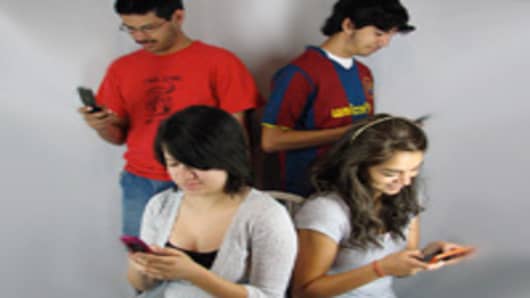Do you know where your children are? If you know where your smart phone is, then you probably do.
For generations parents told their kids, "Call me if you're going to be late." Then, with many kids having mobile phones, it became, "Text me if you're going to be late".
Now, parents don't even have to wait for their children to be proactive—thanks to a growing cottage industry of so called "nanny apps" that can allow parents to monitor their children from or via a mobile device.
You can even use a smart phone because of their GPS functionality.
"People are always connected now," says Life360 CEO and co-founder Chris Hulls. "We see smart phones as the ultimate safety device, and there is a huge potential to leverage these devices in that sector. Smartphones are becoming the OnStar for personal safety."
Life360 offers functionality that includes letting teens with smartphones virtually "check in" to locations instead of calling their parents. Kids can also hit a "panic" button on a remote device that will notify a parent via e-mail, text and phone if they're in trouble, and it tells parents the exact location. For younger kids there is an option to place a small GPS device in backpacks so parents can keep tabs on their kids when they're out and about.
Mobile smartphones, such as Apple'siPhone, as well as Research in Motion's BlackBerry, and the countless Google Android devices out there already have GPS functioning that can make it easy to find the closest cup of coffee, but these can also be used as monitoring applications.
The question is whether these apps will in fact give "peace of mind" for parents, or just make it another thing to monitor during a busy day.
"We're already seeing a lot of helicopter parents, and it is getting worse because of technology such as this," says M2 Research analyst Billy Pidgeon, who is also a high-tech parent of two grade-school boys.
Pidgeon says his nine-year old son is already asking for a mobile phone, because other children have one. Pidgeon notes that he's seeing many parents using this technology as a way to monitor every second of their child's activity.
"We know some parents might want to stay in front of a computer and track every bit of movement their kids make. But we also don't want to be the company that is instilling fear. Our goal is just for people to have peace of mind."
"Some parents buy into this idea of keeping an eye on their kids at all times," adds Pidgeon, who wonders, "If you are constantly watching your kids, how are you taking care of your own life?"
Pidgeon says such technology itself be part of the problem as well as the solution.
"The risks for children haven't really increased, but the Internet makes it so much easier to hear about it when something bad happens," he says. "Thus it is an illusion, and it drives fear and that has people watching their phones instead of their own lives."
Some of the apps available do make it possible for parents to try at least to keep an eye on their kids at all times, although most with a monitoring function are not free. You can’t put a price on good parenting, but app makers know they can put a price on their apps.
The trend isn't just limited to teens or tweens either. Baby Monitor, which is available for $4.99, allows parents to place an iPhone next to a baby, and should the infant start to make noise the app will automatically dial a number so that users can listen from another phone.
Likewise, iCurfew, available for $.99 is one of the more popular of the geo-location based monitoring applications. This one gives parents the ability to know where an older child or teen is at any time. It will even provide a Google Map display so parents can watch where their kids go in real time. Even Hulls believes that level of monitoring can be too much.
"We really want to leave choice with the parents," he says. "We know some parents might want to stay in front of a computer and track every bit of movement their kids make. But we also don't want to be the company that is instilling fear. Our goal is just for people to have peace of mind."
Likewise, as kids today are more tech savvy than even their tech savvy parents, it is necessary to actually work with them instead of merely monitoring them all the time.
"Sometimes parents lean too much on technology to do their actual parenting work," says Michael Sheehan, the HighTechDad and technology blogger. "Technology is merely a tool that can help, or in many cases hurt the parent-child relationship." kids feel the need and desire to actually check in themselves, without the use of a magic app."
For this reason Sheehan believe that apps will never become the ultimate digital babysitter or watchdog for kids. He stresses the need to use actual communication instead of merely a communication device.
"It's really critical that parents are actively engaged, promoting a healthy conversational relationship," says Sheehan, " But also laying rules and groundwork to ensure that their kids feel the need and desire to actually check in themselves, without the use of a magic app."


